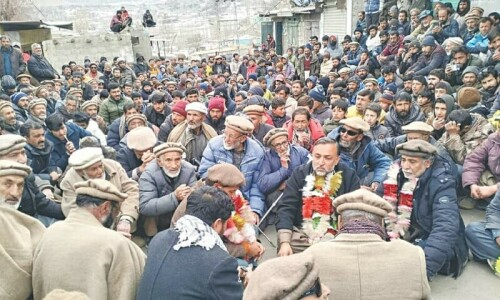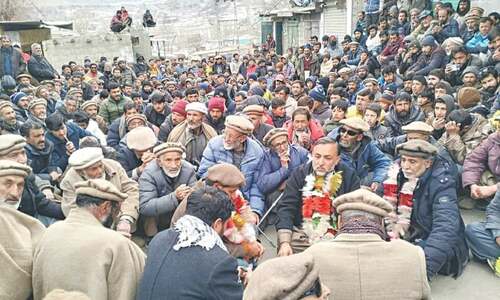GILGIT-BALTISTAN (GB) is embroiled in widespread protests yet again. In the past few years, these protests and sit-ins against the federal government’s decisions for the region have become more frequent. The current protests — against the increase in the subsidised wheat price — have entered their fourth week.
Protests across GB erupted on the call of the Awami Action Committee, an alliance of political and religious organisations, trade unions and CSOs in GB. Braving the harsh weather, the people have been consistently demanding a reversal of the government’s decision to increase the wheat price. People in Skardu have staged the largest sit-in, which entered its 23rd day on Jan 19.
Thousands are protesting in other districts, such as Diamer, Hunza, Ghizer, Ghanche and Nagar, as well. In Gilgit, the deputy commissioner banned demonstrations for three months. The move was challenged by lawyers in the Chief Court, who called the ban illegal.
The GB government’s attempt to persuade demonstrators to postpone their protests until the Feb 8 polls has failed. The assurance of GB Assembly member Fathullah Khan of raising the issue with the new government was not entertained. The efforts of the federal bureaucracy to convince the people have also been unsuccessful. The reason why locals are not convinced by the lawmakers and bureaucracy lies in the lack of trust in their institutions.
For the past few years, the federal government has been taking unilateral decisions for GB. The decisions have resulted in mass protests. GB, due to its disputed status and widespread poverty, was granted subsidy in the 1970s by the then prime minister Zulfikar Ali Bhutto, who initiated reforms in the region. The subsidies were for the prices of wheat, oil, PIA tickets, and some other essential items. Gradually, all subsidies were finished, except wheat.
Although the wheat subsidy issue has drawn the most attention, the list of demands also includes the abolishment of taxes and suspension of the Finance Act, 2023, an end to power outages and the exploitation of GB’s mineral resources, a share in the NFC Award, etc. Most of these demands are not new. In 2022, demonstrations across GB began on similar issues. Their reappearance and similar demonstrations proves the failure of the federal government to resolve the matter.
The GB government’s attempt to persuade demonstrators to postpone their protests until the Feb 8 polls has failed.
GB has been administered largely by the centre. The Finance Act, 2023, aims to generate revenue for GB through taxes and other mechanisms. However, the locals are demanding its suspension because of GB’s disputed status. The region does not have representation in the national legislature. Hence the slogan of ‘no taxation without representation’ is loud and clear.
The local people are also frustrated by the long power outages, which have disrupted businesses and increased their suffering. The absence of electricity has pushed people to rely on firewood for heating, thus putting pressure on the already depleted forests.
Over the past few years, contestation over GB’s land and mineral resources between the state and the people has been increasing. Since the region’s constitutional status is ambiguous, the locals argue that the land and mineral resources belong to the people of GB.
Common land has been used for grazing, collecting firewood and other purposes by the locals for centuries. The state, however, claims that land which is not transferred to any individual belongs to the Pakistani state. The locals believe that their right of rule (haq-i-hakimiyat) and right to ownership (haq-i-milkiyat) is being violated.
The delay by the federal government to resolve GB’s lingering issues is making matters worse. The locals are not just discontented with unresolved issues but also concerned about the mistreatment of the government towards local leaders. Those who raise their voice for rights are often booked under the infamous Schedule IV of the Anti-Terrorism Act of 1997.
According to Ashfaq Ahmad, an advocate from Gilgit, the fourth schedule of the ATA is directed at those individuals who are either part of a proscribed organisation, or involved in terrorism, sectarian or anti-state activities. Such individuals are placed on the list to bar them from taking part in unlawful activities. Their bank accounts are frozen, their movement from one city to another is banned, they can’t address public rallies, and they are placed under surveillance.
However, in the past few years, even civil rights activists, including some religious leaders, have been placed under Schedule IV. In the recent protests, some prominent activists too are in the same position. The move is seen as an attempt by the state to silence local voices protesting for their rights.
The memory of the nine-year illegal imprisonment of Baba Jan, a political activist from Hunza, is still fresh. Baba Jan, due to his political activism in the wake of the Attabad disaster, was sentenced to 71 years’ imprisonment by the anti-terrorism court, despite being released by a civil court.
This unilateral decision-making by the federal government has been rejected by the locals, who want to be involved in the process. The GB Assembly and government should be empowered by the centre rather than being disempowered, as happened recently when the PTI lost its government at the centre and the chief secretary was emboldened to fill the vacuum. That is not how regions are administered.
The call by the protesters to march towards Gilgit on Jan 24 must be taken seriously. The delay will only lead them to adopt a hard-line position. They have already started calling for the dissolution of the present coalition government.
The centre needs to revise its policies and strive to build trust and credibility among the locals. Through dialogue, conciliation, and participatory approach, the chronic issues of GB can be resolved.
The writer is a faculty member at the department of Social Sciences and Liberal Arts, IBA Karachi.
X: saj_ahmd
Published in Dawn, January 20th, 2024














































Dear visitor, the comments section is undergoing an overhaul and will return soon.